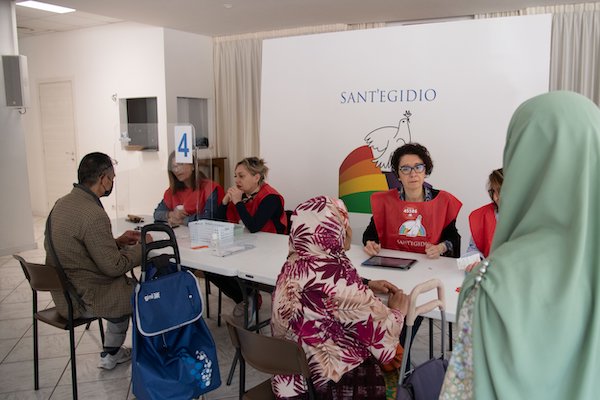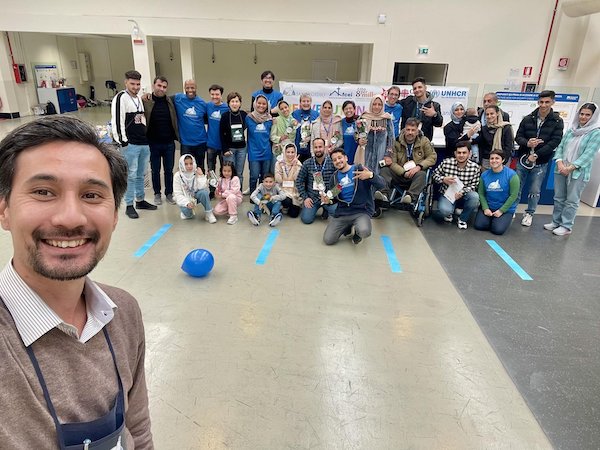
by Dale Gavlak
ROME (CNS) — At a time when the fate of refugees and migrants is becoming increasingly uncertain, faith-based organizations in Rome say they are putting into practice their Christian values of protection and respect of human life to aid those seeking help.
And in the process, they are supporting meaningful integration for those trying to start a new life.
Hamza, a 29-year-old Moroccan, found his life turned upside down at the start of Russia’s deadly war on Ukraine in February 2022. As a foreign student pursuing an advanced degree in energy engineering in Odessa, he knew he could not stay in Ukraine, so he made his way to Rome.
RELATED: Kyiv’s Historic Cathedral Damaged in Russian Air Strikes
“Italy is very good. It’s the Mediterranean, and for me, it’s like home. There’s a respect for different religions and that’s more important than anything else for me,” Hamza, who prefers to use only his first name, told CNS.
For help in Rome, he turned to the Community of Sant’Egidio.
Founded in 1968 in Rome, the lay movement has spread to 70 countries, advocating peace, dialogue and direct service to anyone in need.
Pope Francis encouraged and closely cooperated with Sant’Egidio over the 12 years of his papacy, including by entrusting the group with care of the Syrian refugees he brought to Rome from Greece in 2016.
“Sometimes Pope Francis asked us to do something like Lesbos (helping settle Syrian refugees), other times he offered us a building for the homeless where they could eat and shower and later move into a normal apartment,” Sant’Egidio’s Cecilia Pani told CNS before the U.N. celebration of World Refugee Day June 20.
“We provide different social support activities such as food packages, used clothing, legal advice, aid for those looking for work, cultural orientation, and psychological and educational support to help refugees and migrants live with dignity in Italy,” said Pani, who coordinates the community’s “humanitarian corridors” project for refugees coming from camps in Ethiopia.
Sant’Egidio founder Andrea Riccardo expressed hope for Pope Leo XIV’s continued support of refugees. “He knows poverty, he will be able to build on Francis’ ideas,” he told the Italian Corriere della Sera newspaper in May.
RELATED: Vatican Can Take 3 Key Steps to Bring Ukrainian Kids Back From Russia, Says Child Advocate
During his decades of missionary service in Peru, future Pope Leo upheld the rights of migrants. And since becoming pope, he has advocated for protecting the dignity of those seeking safety or a better life.
At Sant’Egidio, Hamza not only found help, but a home base to serve other refugees. Speaking five languages, including Ukrainian, Arabic and Italian, he also took part in intercultural mediation training through Sant’Egidio, doing university-level studies in sociology, psychology, law and human rights issues. He now serves as one of the counselors to those in need at the center.
Pani said intercultural mediators, like Hamza, bring not only “fresh ideas and solutions to the newcomers,” but can provide a cultural bridge to aid schools, hospitals, the police and other institutions as demographics change in Europe.
Likewise, Rome’s Joel Nafuma Refugee Center (JNRC), which is housed in St. Paul’s Within the Walls Episcopal Church, has also introduced innovative programs helping refugees and migrants gain a sustainable future through its job clinic and training cooperative with ItaliaHello.
Joel Nafuma, a Ugandan priest who fled to Rome to escape the atrocities of dictator Idi Amin Dada, started an informal ministry at the church initially for those escaping conflict in Africa in 1982. Now a bustling center in the heart of Rome, JNRC has served some 12,000 refugees over the past 12 years.
“We offer basic services, such as breakfast, a clothing room, a women/child safe room, psychosocial and legal support, English and Italian lessons, in addition to the job clinic. These allow the guests to take the further step in developing skills that allow them to integrate in Italy or Europe,” Guilia Bonoldi, JNRC program and development director told CNS.
“It is our responsibility that everyone is having a dignified life,” Bonoldi said.
The practicalities of how to apply for work, drafting a curriculum vitae and preparing for face-to-face job interviews are just some of the skills honed by the job clinic.
JNRC is engaged with 18 major companies to provide volunteer training opportunities that can lead to employment. It also has a partnership with ItaliaHello, a Florence-based information service for migrants and refugees. Both organizations were asked to join a national platform and network to provide work assistance nationwide.
“We can ensure that we can serve the applicant and help them enter the job market,” said Bonoldi. “We are dealing with people on the move, and we need to offer support that can be found on the move. And to offer it with civility and enable them to choose where they want to live.”
More than 200 refugees were helped to find suitable employment with this model since 2022, Monica D’Angelo, the JNRC job clinic manager, told CNS. One was an Egyptian teacher who fled persecution in his homeland and was helped with applying for a teaching job in Rome. He made a six-hour roundtrip train journey from his migrant camp to an international school for four years to work as a teaching assistant. He was motivated to succeed and make a new life for himself and his family.
The man, who preferred not to state his name, now has a contract and salary that enables him to rent a room to live near the school and provide for family members.
“We have cases of this kind which are so gratifying and inspirational,” Bonoldi said.
JNRC also provides training on best practices, operating models, fundraising, psychosocial support and volunteer management to 18 Episcopal and Anglican churches to bolster congregations in their support of refugees in Belgium, Cyprus, Germany, Hungary, Poland, Portugal, Romania, Slovakia, the Netherlands, Switzerland and other parts of Italy. The convocation of Episcopal churches in Europe has started a refugee grant program to support ministry to some 40,000 refugees.

